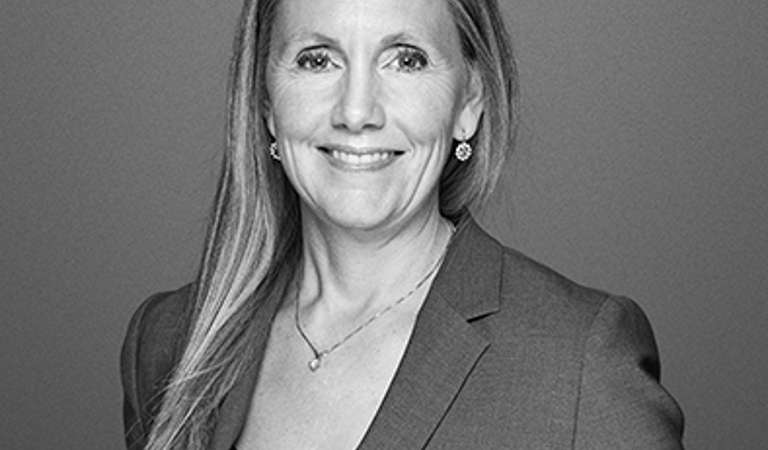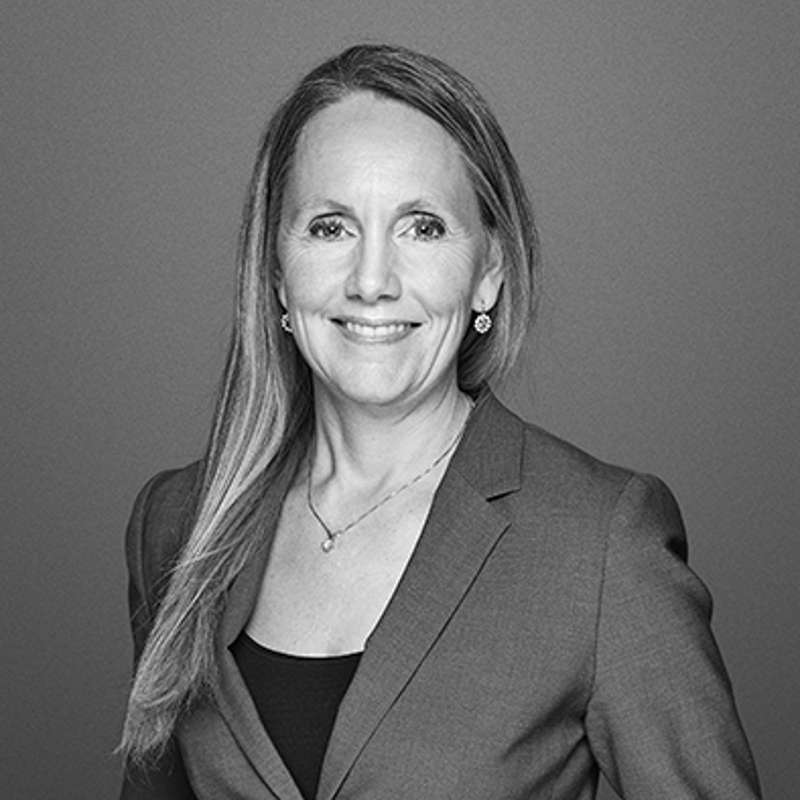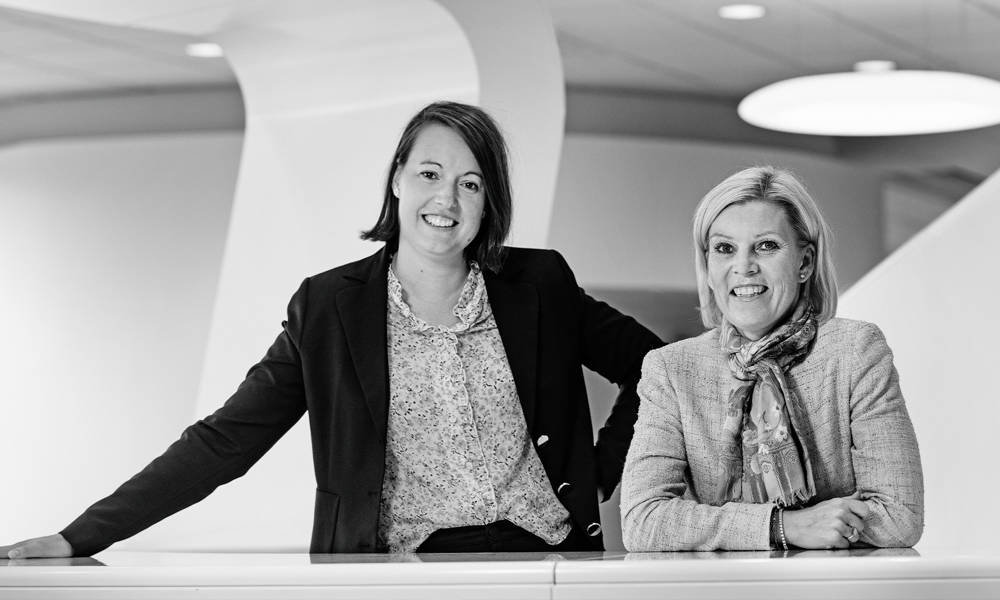The electric vehicle market has grown explosively, resulting in a lack of office space at Clever, which has Denmark’s largest market share of charging infrastructure. In this article, you can read how they responded successfully to the lack of space and learn what to pay attention to if your business is to expand its lease.
Clever’s office building has what it takes to make real estate agents’ eyes shine. Its location at Teglholmen in the southern part of Copenhagen’s port, which offers a sea view from all the big windows and, in the street, commercial buildings and newly built flats are neighbours to small cafés, specialised shops, and supermarket chains.
At Clever’s reception we meet Stine Hödar-Rasmussen and Nicoline Øhlenschlæger Villadsen, who have agreed to tell us how recent years’ explosive growth in their industry has forced Clever to expand its premises not just once, but several times. And not least how and why Clever decided to ask for external consultancy for their expansion and reconstruction project.
From 30 to 300 colleagues
”During the first ten years of Clever’s existence, you were considered rather nerdy if you bought an electric vehicle,” Stine says smilingly. “But in recent years, the market for electric vehicles has more or less exploded, and they have really become common property.”
Due to this development, Clever is doing well – really well, actually. In recent years, they have grown from approximately 30 to 300 employees, and every month they welcome an average of 10 new colleagues.
“The most important thing that I experienced during this period was when we developed from a classic hierarchical organisation into co-management,” Nicoline says. Co-management is a kind of management and collaboration that grants individual teams at the workplace full autonomy to manage themselves.
“We have grown by 100 people annually in recent two years, and it looks as if we’ll do it again for a third year in a row. Co-management has enabled us to grow at this speed without having resulted in many management layers and lots of bureaucracy,” Stine elaborates.
On the other hand, the growth has created space constraints.
“Rather quickly, we ran short of tables where you could sit with your computer. So, we introduced flexible seating,” Nicoline says.
But the number of new colleagues continued to increase. And though the individual teams establish the framework for flexibility themselves, most of Stine and Nicoline’s colleagues often work from the office.
It must be comfortable to work from the office
”It’s important to us that the office is a nice place to be, and then we’ll tackle the accompanying space problems,” says Nicoline. And it has, apparently, worked. “During the corona lockdown, we almost had to send people home because they would rather be here. So, we prioritise that our office is a pleasant to be. And then we’ll find the space needed.”
“Yes, and we think smart,” Stine continues. “We have established some fundamental rules to create room for everybody. For example, we remove our things if we know that we’ll be away from a seat for more than an hour so that your colleague who is coming from a long meeting can get a seat. We have some small boxes for your things to make it easier to move physically. But you’ll never get into the Clever office and not be able to find a place to sit. In the utmost case, you’ll sit another place than imagined.”
Didn’t want to relocate… so they had to expand instead
When it became evident that flexible seating was sufficient to accommodate the large increase in the number of colleagues, Clever began to consider other solutions.
“We felt that we didn’t want to move away from all this,” Stine says and opens her arms towards the rest of the office and the view in the background. “We were so happy about the office and the area and all the possibilities we have here that we wanted to stay, and then we had to find a way in which to make it possible.”
They soon realised that Clever didn’t have the competences in-house to make the dream of having more space come true. Therefore, they joined forces with external experts. Among other things, the job was to examine whether the companies that Clever used to share the office building with were interested in relocating to other premises, and, subsequently, to negotiate the terms and conditions with the neighbours and the owner for the neighbours’ relocation and Clever’s take-over of the new office spaces.
And soon this collaboration became successful.
Big difference between an ordinary negotiation and transfer of a lease
What quickly became evident was the big difference between ordinary occupation and the transfer of a lease from another company in the middle of a lease period. In connection with a transfer, the landlord will not benefit from a restoration. Therefore, these negotiations are tougher and often you’ll have to take over some of the burdens and costs from the tenants moving out.
However, there may nevertheless be money to save, but only if you know right from the start how to define the expenses that will be incurred when you move out of the building – even if this date lies far into the future. As it is, the greatest expenses will often occur when you move out.
When negotiating the transfer of a lease, it is also important to keep in mind that you do not only take over the lease, but also the contract from the former tenant who is moving out. Therefore, you must be especially careful to get a written approval from the landlord and seek to be exempted from re-establishing any new features that you may introduce in the lease transferred to you.
Should you make any adjustments, the leased premises will after all no longer be as described in the contract transferred. And this means that – if you don’t have the landlord’s consent and an exemption from re-establishment – you will have to either restore the leased premises to the original condition or pay the landlord to do so when you move out.
External sparring provided new knowledge – and an eye for blind spots
Following the transfer negotiations, Clever was ready to start the rebuilding and the arrangement as such of the second floor.
Though Nicoline likes the design of the interior and the furniture, she wasn’t comfortable about the comprehensive job that it would be to head the renovation of the new floor.
“Initially, I felt out of my depth. So, I’ve appreciated the assistance and sparring received from others. It’s also given me a better understanding of hard facility management – i.e. the part that concerns the acts and rules that you must take into consideration when arranging, furnishing, or rebuilding a workplace. Though I love interior designing and furnishing, there was much I didn’t know – such as where to locate fire doors or where to install extra ventilation. I know much more about that now, and therefore I also feel ready to start working on our new second floor by myself,” she says and continues.
“Another advantage of external sparring is that you have others look at it from the outside who can identify your blind spots. For example, we’ve appreciated being reminded that – if something isn’t written down in a contract – we can’t be sure that it’s an agreement,” Stine contributes. "So, things have really been included dead-straight in our supplier contracts in a way that we haven’t seen before. And in the meantime, we have become able to succeed with the job ourselves.”
‘The parking space’ systematised input
Furthermore, Clever has found a solution that ensures that everybody can come forward with both small and big wishes for interior arrangements without it taking up too much of the time spent by the group responsible for facility management issues.
“One of the first things our external advisor recommended us, was to introduce a ‘parking space’," Nicoline says and explains that the parking space is a piece of paper on which her colleagues can stick post-its with their wishes. Each week, Nicoline collects the wishes and goes through them at weekly facility meetings to know what people are asking for and whether there are some recurring wishes.
And this is a much-used solution.
“In the parking space, people ask about anything!” Nicoline says enthusiastically. “From cardboard signs in different colours to new rooms. You can really ask about anything here, and then we’ll consider what is possible. For example, many employees wanted meeting rooms where they could close the door. So, they got that when we took over the fourth floor.”
As it were, the former tenant of the fourth floor had left a number of traditional meeting rooms when they moved out. Stine and Nicoline had, however, envisaged a more dynamic type of arrangement with a large curtain functioning as a partition wall so that the same room could function as either a lounge area, workstations, or meeting rooms. But because several colleagues wanted classic meeting rooms, Clever kept the rooms as they were when the former tenant moved out.
And now, the second floor is ready for renovation and furnishing.
When leaving Clever, we can’t help looking into the empty second floor. One of the walls have been painted in dusty green and earth-coloured samples, and the floor is covered in cardboard protection. Nicoline has told us that the interior decoration of the second floor is to ooze of Clever and be high-ceilinged, with large shared areas and many plants. Though the floor is entirely empty right now, it isn’t hard to imagine it buzzing with activity.

Does your company need sparring about your relocation or renovation project?
Whether you are considering relocating, expanding your office premises, renovating or need an interim FM consultant for daily operations, Basico is ready to help. Contact us for a non-binding talk about what we can do for you.

 en
en
 da
da



